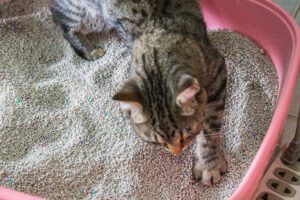Why Do Cats Bury Their Poop?
Welcome to our blog at 441 Animal Hospital in Boca Raton, Florida! Today, we’re exploring a fascinating aspect of feline behavior: burying their poop. This behavior might seem peculiar to us, but for cats, it’s pure instinct. If you’re curious about this behavior or have any other cat-related questions, feel free to call us at (561) 482-5600. Our team is here to help you understand your cat better and provide the best care possible.

Understanding Feline Instincts
Cats are known for their cleanliness and particular habits. One behavior that often catches the attention of cat owners is their habit of burying their poop. This isn’t just a quirky trait; it’s deeply rooted in their instincts. Wild cats bury their waste to hide their presence from predators and other animals. By doing this, they avoid attracting unwanted attention and maintain a low profile in their environment.
How Instincts Affect Domestic Cats
Even though domestic cats don’t face the same threats as their wild counterparts, they still follow this instinct. It’s a fascinating example of how natural behaviors persist even in a safe, controlled home environment. Cats still feel the need to conceal their scent, which is a survival tactic deeply ingrained in their behavior.
The Role of Scent in Cat Communication
Cats communicate in various ways, and scent plays a crucial role. They use scent to mark their territory, identify other cats, and navigate their environment. By burying their poop, cats are essentially keeping their scent communication ‘clean’ and precise. It’s their way of saying, “This is my space, but I’m not looking for trouble.”
The Importance of Scent Markers
Scent markers are like signposts for cats. They give them information about other cats in the area, potential threats, and resources like food. When a cat buries its waste, it’s minimizing its scent markers to avoid giving away too much information.
Health and Hygiene Considerations
Another reason cats bury their poop is for hygiene. In the wild, leaving waste exposed can attract parasites and diseases. By burying it, cats reduce the risk of encountering these health hazards. This behavior also keeps their living area clean, which is essential for a creature as meticulous as a cat.
How This Relates to Home Living
At home, your cat’s litter box is its designated spot for waste. By burying their poop, cats are keeping their living space clean, just like they would in the wild. This instinctual behavior is beneficial for pet owners too, as it helps maintain cleanliness and hygiene in the home.
Stress and Behavior Changes
Sometimes, changes in this instinctive behavior can indicate stress or health issues. If your cat suddenly stops burying its poop, it could be a sign of discomfort or a medical problem. It’s important to pay attention to these changes, as they can be subtle indicators of your cat’s health and well-being.
If you notice any sudden changes in your cat’s litter box habits, it’s a good idea to consult with a veterinarian. At 441 Animal Hospital, we can help you understand these changes and provide the necessary care to improve your cat’s health. Call us at (561) 482-5600 for more information or to schedule an appointment.
Training and Litter Box Habits
Most cats instinctively know how to use a litter box, thanks to their natural burying behavior. However, sometimes young kittens or adopted cats might need a little guidance. Ensuring they have a clean, accessible litter box is the first step in encouraging this natural behavior.
For successful litter box training, provide a quiet, private space for your cat’s litter box. Keep it clean, as cats are more likely to use a well-maintained litter box. If you have multiple cats, consider having more than one litter box in your home to prevent territorial disputes. A general rule is to have one litter box per cat.
Make Sure You’re Using the Right Litter
The type of litter you use can also influence your cat’s burying behavior. Some cats prefer finer litter that mimics the texture of sand, making it easier for them to bury their waste. Experimenting with different types of litter can help you find the best option for your cat. Consider factors like odor control, dust levels, and how easy it is to clean. Your cat’s preference is important, of course, but so is finding a litter that works for you and your home.
Contact Us to Learn More About Your Cat
Understanding why cats bury their poop gives us a glimpse into their fascinating world. It’s a behavior steeped in instinct, communication, and hygiene. As cat owners, appreciating these instincts helps us provide a comfortable and healthy environment for our beloved pets. If you have any questions or need advice about your cat’s behavior or health, don’t hesitate to reach out to us at 441 Animal Hospital in Boca Raton, Florida, at (561) 482-5600.